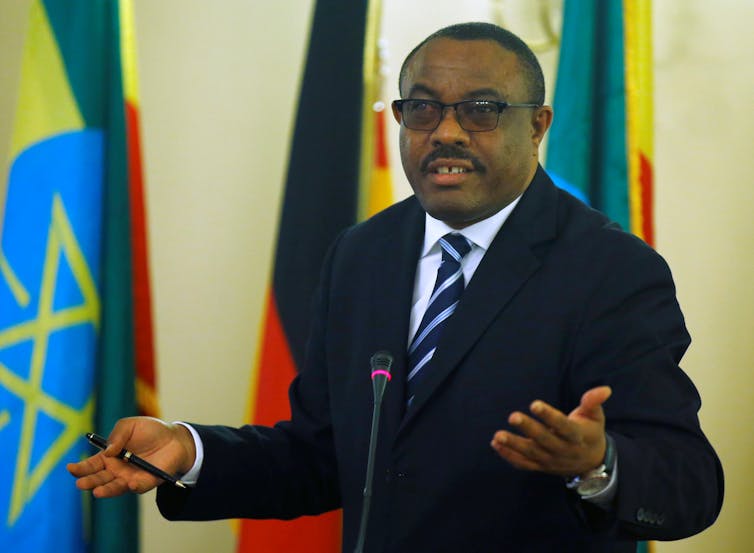
Hailemariam Desalegn, the Prime Minister of Ethiopia has become the first Ethiopian leader to relinquish power willingly. He submitted his resignation letter to the country’s ruling coalition and the House of Representatives after his adminstration’s recent decision to release political prisoners.
His snap resignation suggests that the ruling coalition elites are divided. My considered opinion is that Desalegn was either pressured to resign, or he was simply unable to function independently as the country’s leader.
There is a great deal happening in the country. A day after Desalegn resigned, Ethiopia’s Council of Ministers declared a state of emergency. A previous state of emergency declared in October 2016 was lifted in August 2017. The government said it was lifting the emergency measures because it had fewer security issues. In reality, the state of emergency had failed to quell uprisings in the two largest regions of Amhara and Oromia.
The latest emergency declaration curtails the freedoms of assembly and expression. It has already been criticised by international actors, including the US government.
All eyes are now on the ruling coalition as it deals with the prime minister’s resignation and scrambles to fill his position.
Things are changing quickly in Ethiopia and it is difficult to predict what the ruling coalition will do next. One thing is clear: rather than declaring a state of emergency the ruling regime should come to terms with the popular demand for democracy, the rule of law and political and economic fairness.
End of the road
Desalegn came to power in 2012 and was widely regarded as a technocrat with the potential to spearhead the country towards democratic reforms. At first, Ethiopians had high expectations of him.
But ultimately he failed. The question is why?
Part of the answer lies in how Ethiopia’s politics is structured. The country is ruled by a coalition of parties that includes the Tigrayan People’s Liberation Front, Desalegn’s Southern Ethiopian People’s Democratic Movement, the Oromo Peoples’ Democratic Organisation, and the Amhara National Democratic Movement. Together they form the Ethiopian People’s Revolutionary Democratic Front.
The Tigrayan People’s Liberation Front is the most influential party. It has entrenched the domination of the minority Tigrayan ethnic elite over the government’s executive branch.
Some have argued that Desalegn’s powers were heavily constrained by dominant figures within the Tigrayan People’s Liberation Front. This, despite the fact that the party’s dominance has weakened significantly since former Prime Minister Meles Zenawi. Zenawi was chair of both the ruling coalition and his Tigrayan People’s Liberation Front. He handpicked Desalegn as his successor.
But Zenawi’s death in 2012 led to power struggles within the ruling coalition. Desalegn was forced to govern through a tumultuous period. He is likely to have decided to resign because he didn’t have the power to ensure stability and political accountability. Moreover, reforms have been too slow in the making.
After resigning, Desalegn said that he hoped his resignation would expedite the reform agenda.
What next for Ethiopia?
Desalegn has committed to remaining prime minister until his replacement is selected by the ruling coalition’s central committee. His replacement must also be confirmed by the House of Representatives.
Once his resignation is accepted by the house, the majority political party in parliament will be invited to present its candidates for the premiership. The Ethiopian People’s Revolutionary Democratic Front controls 100% of the seats in the parliament. It, then, will choose the next prime minister.
The process may not be without hiccoughs. Power seems to be shifting in favour of the Oromo Peoples’ Democratic Organisation and the Amhara National Democratic Movement. Their participation in selecting a new premier could change the fortunes of the ruling coalition.
Lema Megersa, leader of the Oromo Peoples’ Democratic Organisation, could emerge as a plausible candidate. He is an outspoken young politician who has been touting Ethiopian unity. But there is a complication. Megersa is not a member of the national Parliament and therefore cannot be elected prime minister. National parliamentary elections must be called if he’s to replace Desalegn.
Abiy Ahmed, Megersa’s deputy in Oromia, has also been mentioned as a potential candidate, along with Demeke Mekonnen, who is the deputy prime minister.
In the absence of a strong opposition and an independent media the question of succession will probably come down to tribe. That said, two of the largest ethnic groups – the Amharas and Oromos – have been on the streets protesting for free and fair elections, real democracy, broadening of the political space and greater freedoms. These are things that most ordinary Ethiopians aspire to regardless of tribe.
The regime’s next moves
Until the Oromia protests the ruling coalition seemed to have absolute control of the state. Following Desalegn’s resignation, it must reckon with the popular demand for deeper reforms towards democracy and rule of law.
![]() The regime stifled democratic growth by muzzling the opposition, civil society and the press. It must now open up the democratic space and invite all stakeholders for national dialogue. The opposition must also play a critical role in holding government accountable and pushing for democratic transition.
The regime stifled democratic growth by muzzling the opposition, civil society and the press. It must now open up the democratic space and invite all stakeholders for national dialogue. The opposition must also play a critical role in holding government accountable and pushing for democratic transition.
Yohannes Gedamu, Lecturer of Political Science, Georgia Gwinnett College


